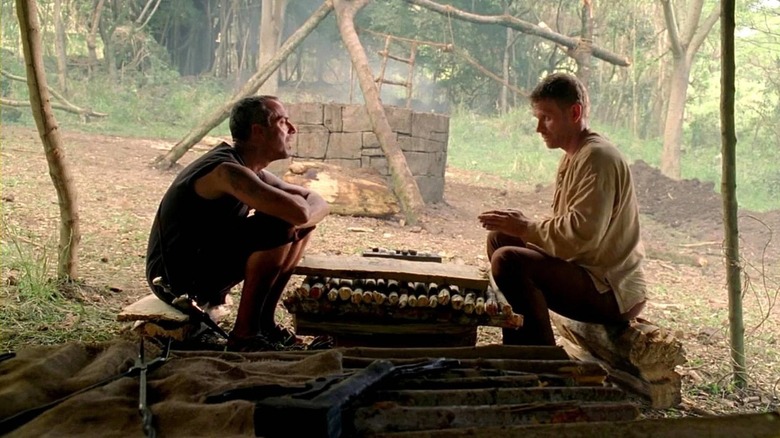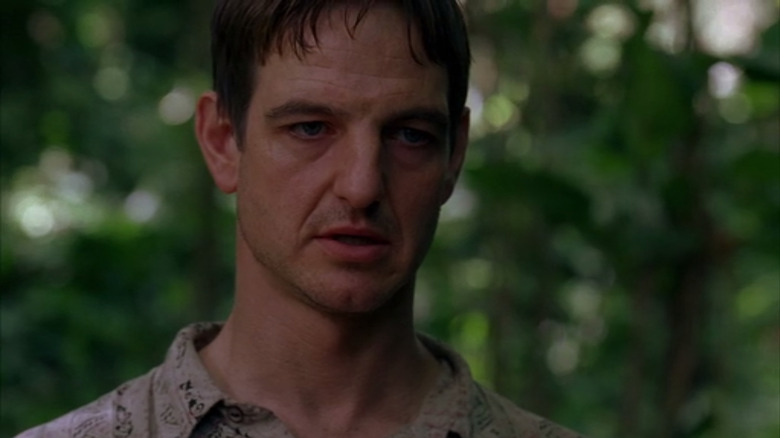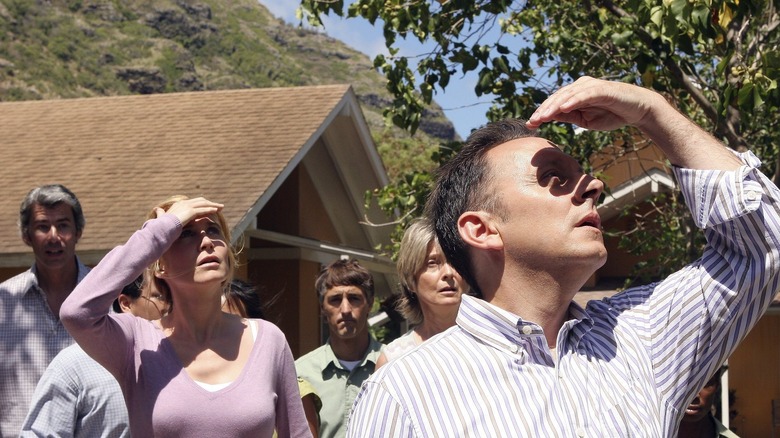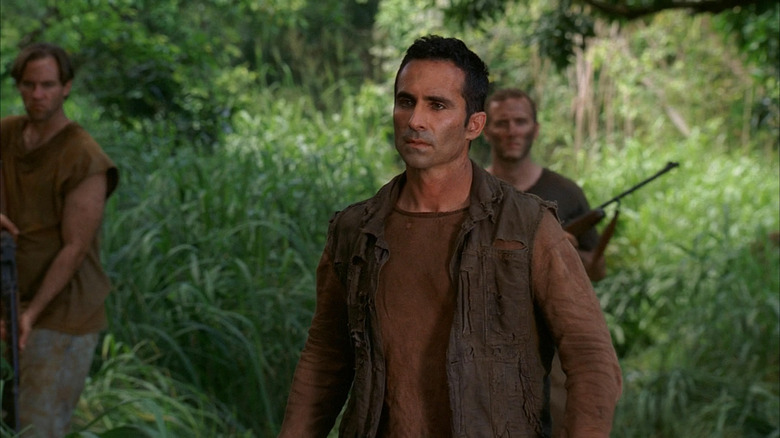The Others' Backstory In Lost Explained
From the first few episodes, a lot of the narrative on "Lost" was focused on the mysterious Others. Having found themselves stranded on a mysterious, seemingly supernatural island, the survivors of Oceanic Flight 815 quickly realize they aren't alone. Not only is there a group of strange, unfriendly people living somewhere close by, but it's soon revealed that one member of that group has been pretending to be a survivor the whole time. Who were these other people? Where did they come from? Why were they kidnapping the survivors? What exactly did they want?
"Lost" had a reputation for not answering its mysteries in a clear, satisfying manner. Questions like "Why was Walt (Malcolm David Kelley) so special?" and "What's the deal with those numbers Hurley (Jorge Garcia) keeps seeing?" are either dropped off entirely, or answered in a boring, anti-climactic way. The motivations and history of the Others, however, are questions the show was more than prepared to handle. Throughout its six seasons, the writers gradually revealed key information about this group of people. Not only did they follow through on answering the audience's questions, but they did so in a way that made "Lost" a more exciting, complex show going forward.
Seasons 1-2: The Others are terrifying
Throughout season 1, the only thing we know about the Others is that they're a group of people who live on the island who have never, as far as we know, made an attempt to reach out to the survivors. (At least, not in a nice way.) In those first few episodes, the revelation that there are other people living on the island isn't met with relief, but with pervading fear and dread. Every time a character finds themselves isolated from the other survivors, the prospect of an encounter with an Other is a constant source of terror. Combine that with the fact that we still don't know what's up with the smoke monster or who's involved with the hatch, and it becomes easy to suspect the Others of being involved with both.
It doesn't help that whenever we do meet the Others, it's because they're kidnapping Claire (Emilie de Ravin), or Walt, or most of the survivors on the tail section of the plane. The episode "The Other 48 Days" in season 2 is basically a 40-minute long horror movie, following the tail-end survivors as they are slowly kidnapped one by one, with no explanation given to those remaining. All we know for sure is that these Others have no qualms about kidnapping children. In fact, they seem interested in taking children in particular.
Our perception of the Others get worse when we meet Benjamin Linus (Michael Emerson). He's an iconic, fan-favorite character, and also one of the most famously manipulative and untrustworthy TV characters of all time. Originally pretending to be an innocent person who recently crashed onto the island himself, Ben effortlessly manipulates our main characters and, in the season 2 finale, reveals himself to not just be a member of the Others, but their leader. When asked who they are, Ben says, "We're the good guys." At first this seems like a delusional thing for him to say, but in season 3 we realize the claim isn't entirely without merit.
Season 3: The Others unmasked
The season 3 premiere, "A Tale of Two Cities," opens up with the introduction of Juliet (Elizabeth Mitchell), a seemingly normal housewife in a pleasant suburban neighborhood. She bakes muffins and hosts a book club, and seems to hold a normal, stress-free life. This is all interrupted by the sound of Oceanic Flight 815 breaking apart above them, and the subsequent reveal that what we've just seen has been a typical day in the life of the Others, right before the main plot of the show began.
Although the Others are still very much the antagonists on the show, season 3 is all about fleshing them out. It's revealed they kidnapped the children of the survivors for the purpose of giving them a better, more comfortable life. They kidnapped Claire because they knew that pregnancies were often deadly on the island and they wanted to make sure she'd be okay. Their reasons for how they selected people to kidnap are made clear: they took the people they deemed "good" and gave them a more comfortable life.
Although the Others are hardly good guys (they're revealed to have murdered the entire town of Dharma employees in "The Man Behind the Curtain"), the show's decision to feature episodes that center around characters within their group, explaining their motivations and their backstory, allow them to consistently play around with the idea that the Others are in fact in the right. Season 3's finale "Through the Looking Glass" centers around the question of whether the survivors should contact a nearby ship for rescue. Ben warns them this would be a huge mistake, that the people on the ship are planning to murder everyone on the island, but Jack (Matthew Fox) decides to go ahead anyway. As the finale ends with the iconic "We have to go back!" scene, the show seems to confirm that Jack eventually realizes Ben was right: trying to leave the island was the biggest mistake he ever made.
Seasons 4-6: The Others demystified
Once the people from the ship start interfering with the island, and as their real intentions become increasingly clear, the Others evolve from an enemy of the survivors to a tentative ally. Now that his focus is set on defeating a group of characters even more duplicitous than he ever was, Ben is turned into an increasingly sympathetic character.
We learn, over the course of these final seasons, that the Others are a group of people chosen by Jacob (Mark Pellegrino) to protect the island, and help in the centuries' long battle between Jacob and the Man in Black (Titus Welliver). As the Man in Black becomes clearly defined as the main antagonist in the final season, the distinction between the Others and the original survivors are almost non-existent, the interactions between the two groups becoming increasingly peaceful and cooperative.
We learn that Richard was the first man recruited by Jacob, and that Jacob gifted him with eternal life. Although Richard was Jacob's representative, he wasn't always the main leader of the group. Leaders like Charles Widmore (Alan Dale) and Ben took over, and they corrupted the Others for their own selfish reasons. Although many of the Others' actions throughout the series are inexcusably bad, it becomes clear that the Others have always been made up regular people, not the psychopathic monsters they initially seemed to be.
The series ends with Hurley taking Jacob's place as leader of the Others, with a redeemed Ben as his second-in-command. With one of the main survivors we've followed since the beginning of the show taking over the group, the Others have been fully unveiled. Far from the mysterious, hostile group of people they originally seemed to be, the show ends with the group in good hands, with what looks like a bright, peaceful future ahead of them.



